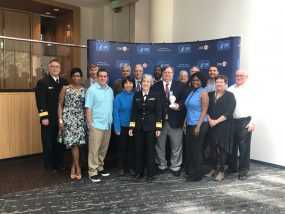Division of Laboratory Systems Biosafety Initiatives
In April 2016, the Department of Health and Human Services’ Clinical Laboratory Improvement Advisory Committee (CLIAC), declared clinical laboratory biosafety a “critical unmet national need,” and called upon the U.S. government to develop a biosafety strategy for clinical laboratories focused on substantially increasing the amount of biosafety guidance and training to the clinical laboratory community.
|
Training and Workforce Development Programs for Public Health and Clinical Laboratories
Laboratories across the nation play a critical role in advancing public health and clinical laboratory science. The Division of Laboratory Systems (DLS), in the Center for Surveillance, Epidemiology, and Laboratory Services, is one of many programs across CDC that help train the nation’s laboratory professionals. Learn more.
 CDC Laboratory Training Collaborative received the 2016 Honor Award for the development of laboratory safety courses. |
The Division of Laboratory Systems within the Center for Surveillance, Epidemiology, and Laboratory Services works to strengthen the nation’s clinical and public health laboratory system through various initiatives geared towards continually improving quality and safety.
- Enhance direct communication between CDC and clinical laboratories to distribute guidance on Clinical Laboratory Improvement Amendments (CLIA) regulations, laboratory biosafety recommendations, and training opportunities.
- Develop regulatory standards and guidelines to implement and support the CLIA regulations, which govern all healthcare-related laboratory testing performed on people in the United States to ensure the accuracy, reliability, and timeliness of laboratory test results.
- Manage and support the Clinical Laboratory Improvement Advisory Committee (CLIAC), a federal advisory committee that provides independent scientific guidance to HHS onimproving laboratory quality and safety practices.
- Develop, in partnership with CDC’s Office of the Associate Director for Laboratory Science and Safety (OADLSS), CDC safety training courses for laboratory professionals nationwide.
- Create and implement, in partnership with the Association of Public Health Laboratories, the Competency Guidelines for Public Health Laboratory Professionals that serve as roadmaps for ensuring a well-trained, highly skilled and competent workforce. These professionals carry out critical laboratory testing activities needed to safeguard the public’s health.
- Advance the knowledge, competency, reliability, and sustainability of the clinical and public health laboratory capacity through training and workforce development initiatives.
- Establish public–private partnerships with clinical laboratories to prepare the country for infectious disease outbreaks requiring large-scale clinical diagnostic testing.
- Inform national laboratory capacity for emergency preparedness and response.
Questions?
- Page last reviewed: August 29, 2017
- Page last updated: August 29, 2017
- Content source:


 ShareCompartir
ShareCompartir